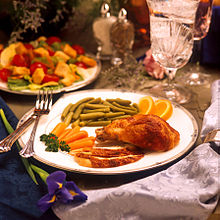Dinner
| Part of a series on |
| Meals |
|---|
 |
| Meals |
| Components and courses |
| Related concepts |

Dinner usually refers to the most significant, and important, meal of the day, which can be the noon or the evening meal. However, the term "dinner" can have many different meanings depending on the culture; it may mean a meal of any size eaten at any time of day.[1][2] Historically, it referred to the first meal of the day, eaten around noon, and is still sometimes used for a noontime meal, particularly if it is a large or main meal. However, the meaning as the evening meal, generally the largest of the day, is becoming standard in most parts of the English-speaking world. The average dinner time in the U.K. for those who call their evening meal dinner has been found to be at 7.47pm. [3]
History and etymology
Originally, dinner referred to the first meal of a two-meal day, a heavy meal occurring about noon, which broke the night's fast in the new day. The word is from the Old French (ca 1300) disner, meaning "breakfast", from the stem of Gallo-Romance desjunare ("to break one's fast"), from Latin dis- ("undo") + Late Latin ieiunare ("to fast"), from Latin ieiunus ("fasting, hungry").[4][5] The Romanian word "dejun" and the French "déjeuner" retain this etymology and to some extent the meaning (whereas the Spanish word "desayuno" and Portuguese "desjejum" are related but are exclusively used for breakfast). Eventually, the term shifted to referring to the heavy main meal of the day, even if it had been preceded by a breakfast meal (or even both breakfast and lunch).
In Europe, the fashionable hour for dinner began to be incrementally postponed during the 18th century, to two and three in the afternoon, until at the time of the First French Empire an English traveler to Paris remarked upon the "abominable habit of dining as late as seven in the evening".[6] Perhaps under the influence of this new European tradition, the main meal for the day in the English-speaking world gradually changed into being the evening meal. Because of this shift, the word "dinner" acquired a meaning as the end-of-day meal along with meaning the main meal, and now many speakers will in fact refer to the evening meal as "dinner" even if it has been preceded by larger meals, thus divorcing the word almost entirely from its original meaning.
Time of day
In most modern usages, the term dinner now refers to the evening meal, which is now often the most significant meal of the day in English-speaking cultures. When using this meaning, the preceding meals are usually referred to as breakfast and lunch. In some areas, the tradition of using dinner to mean the most important meal of the day regardless of time of day leads to a variable name for meals depending on the combination of their size and the time of day, while in others meal names are fixed based on the time they are consumed.
The divide between different meanings of "dinner" is not cut-and-dried based on either geography or socioeconomic class. Even in systems in which dinner is the meal usually eaten at the end of the day, an individual dinner may still refer to a main or more sophisticated meal at any time in the day, such as a banquet, feast, or a special meal eaten on a Sunday or holiday, such as Christmas dinner or Thanksgiving dinner. At such a dinner the people who dine together may be formally dressed and consume food with an array of utensils. These dinners are often divided into three or more courses. Appetizers consisting of options such as soup, salad etc., are followed by the main course then the dessert.
See also
References
- ^ Olver, Lynne. "Meal times". Lynne Olver. Retrieved 2 April 2014.
- ^ (October/November 2001.) "What time is dinner?" History Magazine. Accessed September 2011.
- ^ Average dinner time is now 7.47pm as work hours eat into our meal times.
- ^ etymology of "dinner" from Online Dictionary. Accessed November 11, 2009.
- ^ Etymology of "dine" from Online Dictionary. Accessed November 11, 2009.
- ^ Quote in Ian Kelly, Cooking for Kings: the life of Antonin Carême the first celebrity chef, 2003:78. For guests of Talleyrand at the Château de Valençay, dinner under Carême was even later.
External links
- "Dinner" definition from Cambridge.org
- Wikibooks Cookbook
